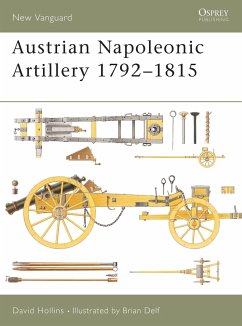
German Field Artillery of World War II
Versandkostenfrei!
Versandfertig in 2-4 Wochen
19,99 €
inkl. MwSt.
Weitere Ausgaben:

PAYBACK Punkte
10 °P sammeln!
An illustrated study of the big guns of Hitler's army - the Wehrmacht's field artillery, its capabilities and its role in German fighting units of World War II. Often overshadowed in military history by the tanks and aircraft of Blitzkrieg, Germany's artillery was key to its methods of waging war throughout World War II. Field artillery remained the primary killer on the battlefield, often responsible for three-quarters of combat casualties inflicted. Redressing the balance, this book surveys the major Wehrmacht guns of the war, and the basic organizational structure of the German field artill...
An illustrated study of the big guns of Hitler's army - the Wehrmacht's field artillery, its capabilities and its role in German fighting units of World War II. Often overshadowed in military history by the tanks and aircraft of Blitzkrieg, Germany's artillery was key to its methods of waging war throughout World War II. Field artillery remained the primary killer on the battlefield, often responsible for three-quarters of combat casualties inflicted. Redressing the balance, this book surveys the major Wehrmacht guns of the war, and the basic organizational structure of the German field artillery. Its primary focus is on the divisional field guns, especially the lFH 18 10.5cm field howitzer and the 15cm sFH 18 field howitzer that formed the backbone of German artillery. A brief survey is also made of the infantry guns used at the regimental level, and of corps-level heavy artillery. The issue of the use of"Beutewaffen," captured war-booty field guns, is also looked at, as is the Nebelwerfer and schwere Wurfgerät rocket artillery. With archive photos and meticulously detailed new illustrations, this book provides a concise study of the German Army's big guns of World War II, how they were organized and how they were used, both on the Eastern and Western fronts.













